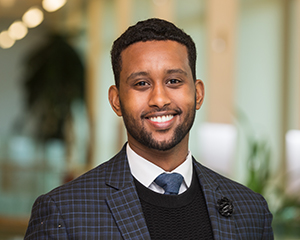MPH and MS Capstone Projects Tap into a Virtual Powerhouse of Healthcare Innovators
The Dartmouth Institute alumni network is a mighty force. The over 1,200 graduates are as equally dedicated in their mission to lead change in health and healthcare as they are in their commitment to support future MPH and MS alumni on their own professional journeys. This year, amid the most challenging times in public health, the Institute’s alumni are stepping up in an important way by mentoring current students in their capstone research.
Throughout the remote spring term, several dozen alumni participated in peer review sessions via Zoom to help students refine and polish their independent research projects. They offered unique guidance not only from their academic experiences but also from the diverse career paths their degree has taken them on since Dartmouth.
Karen Homa PhD’06, MS’00, brought her decades of experience as a healthcare consultant, including consulting work she has done with the Cystic Fibrosis Foundation, to help them deploy a nationwide survey on patient and family experience of care.
University of Michigan medical student Ben Cher MS’18 brought his health policy research expertise as a lead author on a forthcoming paper on how Medicare payment models account for social determinants of health.
Two of the student capstone projects Homa and Cher reviewed included pioneering work in different areas across public health:
 A qualitative study by Danielle Voke MPH’20 is potentially the first to characterize individual experiences of telecontraception use. During COVID-19, telecontraception has gained attention and momentum as an emerging telemedicine service to facilitate birth control pill access. Voke’s study represented perspectives from six major U.S. telecontraceptive services among participants residing across 11 different states.
A qualitative study by Danielle Voke MPH’20 is potentially the first to characterize individual experiences of telecontraception use. During COVID-19, telecontraception has gained attention and momentum as an emerging telemedicine service to facilitate birth control pill access. Voke’s study represented perspectives from six major U.S. telecontraceptive services among participants residing across 11 different states.
 A research manuscript by Yasir Salih MPH’20 explores the odds of all-cause 30-day readmissions in ischemic stroke survivors, the most common type of stroke, with severe mental illness (SMI). Persons with SMI are at high risk of an ischemic stroke, and at high risk for hospital readmissions following the stroke, yet little is known about the odds of readmissions. Salih’s work documents the higher odds that stroke survivors with SMI face and can inform the development of preventative measures to reduce readmissions.
A research manuscript by Yasir Salih MPH’20 explores the odds of all-cause 30-day readmissions in ischemic stroke survivors, the most common type of stroke, with severe mental illness (SMI). Persons with SMI are at high risk of an ischemic stroke, and at high risk for hospital readmissions following the stroke, yet little is known about the odds of readmissions. Salih’s work documents the higher odds that stroke survivors with SMI face and can inform the development of preventative measures to reduce readmissions.
Cher says the opportunity for Voke and Salih to gain multiple perspectives on early drafts of their work from alumni, faculty, and classmates during the peer review sessions was essential to informing the next iterations of their research.
“Both projects benefit from a rigorous scientific approach that incorporates a public health perspective – and it is so much more valuable to learn from someone who shares a different perspective than somebody who shares your own,” says Cher.
For Salih, the collective feedback he received helped refine his research question. Additionally, he attributes the research capabilities he developed at Dartmouth to his success in navigating the Nationwide Readmissions Database for his study, which contains information on approximately 18 million linked discharges across 22 states.
"Prior to starting my MPH degree at Dartmouth, I would not have fathomed that I would gather the skills necessary to analyze a database of this size," says Salih. Homa reiterates the importance of what the students' work contributes to shaping the future of public health.
"What impressed me most was clearly the reason why The Dartmouth Institute exists and why students come to receive an education: we all have the passion to learn how to improve population health and the delivery of it," says Homa. "All of the research design, data collection and data analysis, and the really hard work of communicating our findings to others enables us to think critically about an issue to come up with viable solutions."
POSTED 6/13/2020 AT 09:03 PM IN #news #education
GET IN TOUCH
To arrange a media interview, please contact:
geisel.communications
@dartmouth.edu

